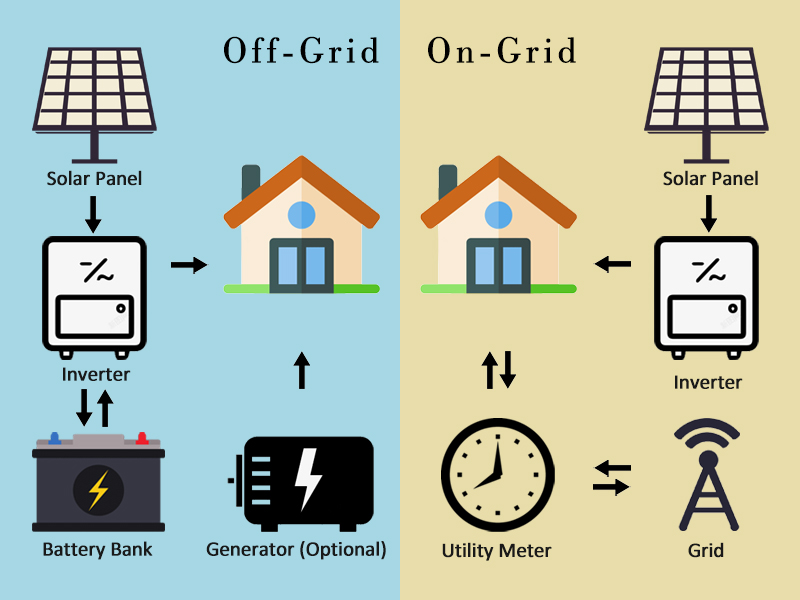As the world becomes more aware of the importance of renewable energy, solar energy has become a popular alternative to traditional electricity. When exploring solar energy options, two terms often come up: on-grid solar systems and off-grid solar systems. Understanding the fundamental differences between these two systems is critical to making an informed decision about your solar energy needs. In this blog, we’ll explore the differences between on-grid and off-grid solar systems and shed light on the benefits of each.
On-grid solar system:
On-grid solar systems are connected directly to the local utility grid. These systems use solar panels to convert sunlight into electricity, which is then fed into the grid. The electricity generated can be used to power your home or business, or excess energy can be fed back into the grid. This is achieved through net metering or a feed-in tariff agreement, where you receive credits or financial compensation based on the excess power generated by the system.
Advantages of on-grid solar systems:
1. Cost-Effectiveness: On-grid solar systems are generally more cost-effective than off-grid systems, primarily because they eliminate the need for energy storage devices (batteries). This makes them an attractive option for those looking to reduce their energy bills without incurring large upfront costs.
2. Seamless power supply: With an on-grid solar system, you can rely on the grid for power during periods when your solar panels are unable to produce enough power, such as at night or on cloudy days. This ensures that you get an uninterrupted, continuous power supply.
3. Environmental benefits: Through solar power generation, on-grid solar systems help reduce the overall demand for fossil fuels and help create a cleaner, greener environment.
Off-grid solar system:
Off-grid solar systems, also called stand-alone systems, are independent of the local utility grid. These systems typically consist of solar panels, charge controllers, batteries, and inverters. Solar panels convert sunlight into electricity, which is stored in batteries to power your home or business.
Advantages of off-grid solar systems:
1. Energy Independence: Off-grid systems provide complete energy independence, allowing you to generate and consume electricity without relying on the grid. This makes them an excellent choice for remote areas or locations with limited or unreliable grid access.
2. Power supply during grid failure: With an off-grid system, you will not experience any power outage during a grid failure since the system operates independently.
3. Environmental Sustainability: Off-grid systems are completely self-sufficient, helping to reduce carbon emissions and reliance on non-renewable energy sources.
In conclusion
When deciding whether to go with an on-grid or off-grid solar system, it’s important to consider your location, energy needs, and budget. Grid-tied systems are ideal for urban areas with reliable grid access and areas seeking economic benefits from net metering. Off-grid systems, on the other hand, offer energy independence and are suitable for remote locations or individuals who prioritize self-sufficiency. By understanding the key differences between these systems, you can make informed decisions that fit your energy needs and future goals. Remember, no matter which system you choose, solar power is a stepping stone toward a more sustainable future.
If you are interested in off grid solar system price, welcome to contact Radiance to read more.
Post time: Sep-15-2023


